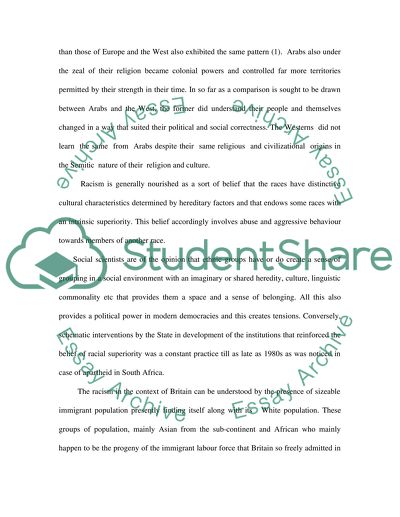Cite this document
(Racism and its Existence in Contemporary Britain Essay - 1, n.d.)
Racism and its Existence in Contemporary Britain Essay - 1. Retrieved from https://studentshare.org/social-science/1545446-what-do-you-understand-by-the-term-racism-using-examples-from-one-of-the-areas-of-policy-we-have-covered-explain-the-existence-of-racism-in-contemporary-brit
Racism and its Existence in Contemporary Britain Essay - 1. Retrieved from https://studentshare.org/social-science/1545446-what-do-you-understand-by-the-term-racism-using-examples-from-one-of-the-areas-of-policy-we-have-covered-explain-the-existence-of-racism-in-contemporary-brit
(Racism and Its Existence in Contemporary Britain Essay - 1)
Racism and Its Existence in Contemporary Britain Essay - 1. https://studentshare.org/social-science/1545446-what-do-you-understand-by-the-term-racism-using-examples-from-one-of-the-areas-of-policy-we-have-covered-explain-the-existence-of-racism-in-contemporary-brit.
Racism and Its Existence in Contemporary Britain Essay - 1. https://studentshare.org/social-science/1545446-what-do-you-understand-by-the-term-racism-using-examples-from-one-of-the-areas-of-policy-we-have-covered-explain-the-existence-of-racism-in-contemporary-brit.
“Racism and Its Existence in Contemporary Britain Essay - 1”. https://studentshare.org/social-science/1545446-what-do-you-understand-by-the-term-racism-using-examples-from-one-of-the-areas-of-policy-we-have-covered-explain-the-existence-of-racism-in-contemporary-brit.


